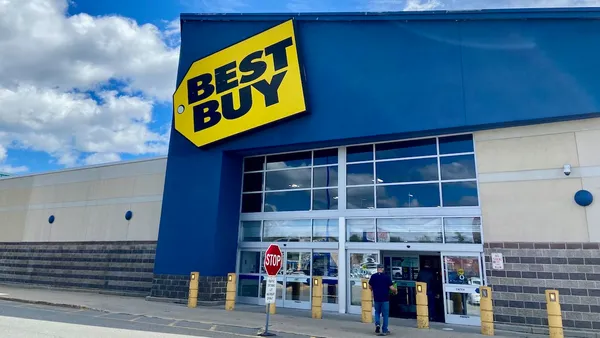Dive Brief:
-
Barnes & Noble on Wednesday evening announced it has entered into a formal review process to evaluate strategic alternatives, including a possible sale. The move comes on the heels of "expressions of interest from multiple parties," including from Chairman and Founder Leonard Riggio, the company said in a press release. Shares rose as much as 24% on the news, Reuters reports.
-
A special committee of independent directors appointed by the board will lead the process. Members include: Mark Carleton, Paul Guenther, Patricia Higgins and Kimberley Van Der Zon. Riggio said he will vote his shares in favor of any recommendation from the committee, according to the release. Investment bank Guggenheim Securities and law firm Paul, Weiss, Rifkind, Wharton & Garrison will advise the board throughout the process.
-
The company also adopted a short-term so-called poison pill plan after noticing "rapid material accumulations of its stock" by an unidentifiable party. Under the terms of the plan, the rights to which expire in one year, Barnes & Noble shareholders could receive preferred shares at a 50% discount if an individual or group were to acquire 20% or more of the company through stock or a tender offer. The company did not respond to Retail Dive's request for more information.
Dive Insight:
It's the first time the big-box book retailer has openly talked about the possibility of a sale, but it's apparently not the first time someone has made an offer. In a lawsuit filed last month against the company by ex-CEO Demos Parneros (who was fired for violating the company's conduct code) he revealed that a bookseller had tried to buy Barnes & Noble earlier this year, but that the deal ultimately fell through. It's unclear exactly why the deal crumbled, but there are apparently other bidders lining up now.
In the eyes of Mike Edwards, former CEO of Borders, the board's move to explore a sale is good news. Perhaps good news that should have come much earlier. "I also think new ownership always bring fresh thinking and new ideas, maybe a way to create a different business," he told Retail Dive in an interview on Thursday. "For all those reasons I think the board is acting responsibly."
It's unlikely that many retailers are interested in the book behemoth, which still operates 629 locations across all 50 states, amid struggles with a costly supply chain. Private equity is a more likely route, Edwards said. So far, from his vantage point, private equity ownership has been a positive experience for Staples, where he previously worked between 2012 and 2015. "I don't think if they don't sell they go away, but they're still under the pressure of being public," he said.
It's also under pressure to name a new CEO — the fifth in as many years. That process, however, may become more difficult as the company considers a sale.
Some industry experts aren't so optimistic about Barnes & Noble's future, deal or no deal.
"The business they are in can only shrink, which means there really are two choices: one is that you manage that decline. But shrink doesn't mean no money," Mike Shatzkin, longtime book industry consultant and CEO of The Idea Logical Company, told Retail Dive in an interview Wednesday. While the company may be in turmoil, it still has a market cap of roughly $398.7 million.
"The second choice is to use what you've got as a springboard to other things, which is what Amazon did," Shatzkin added. In many regards, that's the model that Indigo Books and Music has taken, too.
"Cross merchandising in the store enabled [Indigo] to sell new products, and it wasn't just folks slapping them up on new shelves, but selling them in an integrated way that also drove the sale of books," Joel Silver, former Indigo President and chief merchant, told Retail Dive in an interview last month.
Riggio, now in his late seventies, has signaled several times over the last few years that he's ready to step away from the company. A revolving door of CEOs, however, may have kept him hesitant that the company was in good hands.
"What he is looking for is an exit that gives him a certain amount of pride, an exit that doesn't look like a defeat," Shatzkin said. "I feel badly for people like him because it's not their fault that the world changed."













